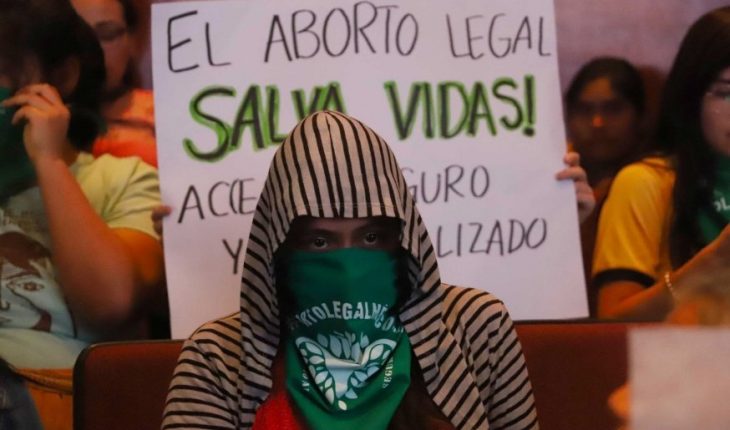On September 25, 2019 – in a historic vote – Oaxaca became the second entity in the country to decriminalize abortion that was punishable by six months to two years in prison. It had been 12 years since the CDMX had become the first entity to take this step, so what happened in Oaxaca could not have been celebrated anymore.
Two years after that day, the reality for women in Oaxaca who want to terminate their pregnancy has changed little.
The stigma and the moral and religious discourses they receive from the doctors they approach to request support, as well as the lack of spaces – close to the communities and willing to fully exercise this right – are present obstacles, despite the change in the law.
According to the Health Services of Oaxaca (SSO), 962 medical units operate throughout the state between mobile, fixed, first and second level, however, if a woman wishes to exercise her right to legal interruption of pregnancy (ILE) she can only do so in two places: the General Hospital “Aurelio Valdivieso” and the Women’s Clinic, both located in the state capital.
Read: Oaxaca and the global cry for legal abortion
Yésica Sánchez Maya is a member of the management team of the organization Consorcio Oaxaca. In an interview with Political Animal explains that after the decriminalization of abortion, circulars were sent, forums were organized and there were meetings and trainings to sensitize health personnel on the subject, but if this is added to the moral and religious burden rooted between health personnel and the authorities, efforts are still insufficient.
“Without a doubt, they were not ready to (offer) any kind of service,” says the feminist activist.
“On the subject of abortion, the detail is that it is not so complex because even between 12 weeks can be medical abortions -simple- that do not properly require the surgical room, but they have tried to distort that abortion involved hospitalizing and putting in a room, expelling and doing onerous procedures. ”
When women arrive applying for ILE, medical staff respond reluctantly. So they always recommend that women carry with them – whether physical or virtual – a copy of the official newspaper in which their right to access this right is clear.
Asked why only two medical units across the state are able to perform ILE, the state Health Services argued that the infrastructure is sufficient because they have not been in as much demand as they had hoped.
Find out: The green tide wins in Oaxaca: Local Congress approves decriminalizing abortion
“It is not such a high or large number of users who have required the service and that is something that has caught our attention because we thought, perhaps as happened in the CDMX, that there were going to be many requests for the service, but no,” Vladimir Hernández Sosa, head of the Preventive Medicine Unit of the Health Services of Oaxaca, said in an interview.
As of November 30, 2021 – two years and two months after the decriminalization of abortion – the state health authorities confirmed that 92 LEIs have been carried out in these two units. In Mexico City, for example, since abortion was decriminalized, 395 procedures have been performed on women who reported living in Oaxaca, 41 of them only between 2019 and 2021, after the reform of the penal code of that entity.
On the profile of the users served in these two years, the official said that they have been professionals who “do not have problems related to illiteracy issues.”
Inegi data reveal that in Oaxaca 12 out of every 100 people over the age of 15 cannot read or write. The national average is 5 out of 100.
Before the end of 2021, the official said, there is a commitment to six clinics – and not just two – in which the ILE service is offered free of charge, an even much lower number taking into account that in Oaxaca there are 570 municipalities where 2.1 million women live.
Faced with the lack of options for women to access safe abortion, on September 22, just on the eve of the second anniversary of the decriminalization of abortion, the state Congress approved a reform to the local Health Law in order to guarantee women free, safe and discrimination-free medical care when they decide to terminate their pregnancy before twelve weeks of gestation.
Read more: 20% of women in prison have had an abortion: ENPOL 2021
And, although since 2019 the Criminal Code of Oaxaca was reformed so as not to criminalize the ILE, the collectives had denounced that there are no public spaces where safe abortion was practiced and that in both places where it is done, Oaxacan women had their right to decide hindered.
“It was really necessary that these health services be guaranteed from the law for women who want to decide on their own body, for women who want to terminate their pregnancy, because only in this way – having the law – can we force the Secretary of Health (Juan Carlos Márquez Heine) to provide this service to women,” exposed the former deputy Magaly López Domínguez, promoter of the reform.
As part of the approved amendments to the state health law, he explained, it was also established that when a woman comes to request the legal interruption of her pregnancy, the procedure must be performed no later than three days after submitting her application.
Collectives, activists and women who have exercised their right – not before facing a series of obstacles – realized how, although the decriminalization of abortion in Oaxaca is legal, in practice there are more pending than advances, especially if one thinks about access to this right by women living in indigenous communities to 6, 8 or 10 hours on the way to the capital.
‘That girls and young women continue with their life plan’
Ángeles is a member of the Revueltas Independent Collective that is dedicated to the promotion and dissemination of sexual and reproductive rights; the prevention and care of sexual violence and access to abortion for girls and adolescents in communities originating in Oaxaca.
The Collective points out that the indigenous and Afro-Mexican girls and young women of the Mixteca off the coast of Oaxaca are not in the same conditions of access because they never received information and, even less, health services were enabled to guarantee them access.
Read: Colima is painted green: approves decriminalization of abortion up to 12 weeks
Well, there are technical guidelines for access to safe abortion at the federal level but not one that makes visible the different contrasts and contexts of the state: Oaxaca has 570 municipalities integrated into eight regions, where 15 of the 68 ethnolinguistic groups of the country are located.
The collective worked with a group of 32 Afro-Mexican girls and young women between the ages of 15 and 25, originally from the communities of Mancuernas, San Miguel Tlacamama, Santo Domingo Armenta, Río Grande and El Chamizal, in the Costa Chica region.
97% of the young women said that every time they have gone to the health center or health houses in their community, there are no medicines or equipment for their care so they have to move to spaces far from their community.
87% said they have lived situations where the treatment is derogatory and do not clarify their doubts because the consultations are very fast and do not even look at them.
As part of the work carried out by this collective, they have asked young people from the different communities they visit to go to the health center and ask for information about the ILE. The answer they have had is negative and they have been repeatedly questioned why they are asking about the issue.
Accompaniment
In 2016, Sharon, then 16, had moved to downtown Oaxaca where she had begun her high school studies. At the same time she found out that she was pregnant. She says she felt very afraid, but she and her then-partner took responsibility for the decision they would make. They didn’t inform anyone.
She terminated her pregnancy in hiding. First an injection that did nothing to him, he even thinks it may have been just water, and then he took some pills.
“When the product started coming out I was on the street, I didn’t know I had to be at rest. I mean, like they told me another story, the doctor just told me to put on a towel,” she explains.
After this experience, the young woman decided to train as a companion. She still lives in Oaxaca’s capital, but regularly visits her community — an eight-hour drive away — where women can’t decide on their bodies, there are no clinics to go to, and doctors sometimes don’t even know abortion is no longer criminalized.
“For a colleague of the Zapotec, Mixhe or Mixtec community who lives in a town that is 8 hours from the capital because it is not as accessible as the law mentions. There are several limitations because you have to go to the city and there is neither the time nor the money to get there, “he reproaches.
“Emotionally it’s frustrating”
Given the failure of the authorities to attend to women living outside the capital of Oaxaca, it is the collectives and civil associations who have assumed the responsibility of carrying information and accompanying them. One of them is Meraki: Weaving Community.
Anabel, Alba, Magally and Luz -who make up this collective- provide psychological servicesorgicos and visit the most remote regions of central Oaxaca.
A few months ago, Alba says, they visited a community where they taught some courses and workshops. While they were there, a woman was raped.
The sanction for the aggressor was a payment of 3 thousand pesos as compensation for the damage. It was the collective who sought medical help to avoid sexually transmitted infections or an unwanted pregnancy. The doctor was not there because she had gone to another community.
To meet the needs they have, Anabel explained, the collectives are no longer only investing time to support the women of downtown Oaxaca and other communities, but they are also investing economic resources to have their own medicine bank.
What we do at Animal Político requires professional journalists, teamwork, dialogue with readers and something very important: independence. You can help us keep going. Be part of the team.
Subscribe to Animal Político, receive benefits and support free journalism.#YoSoyAnimal





